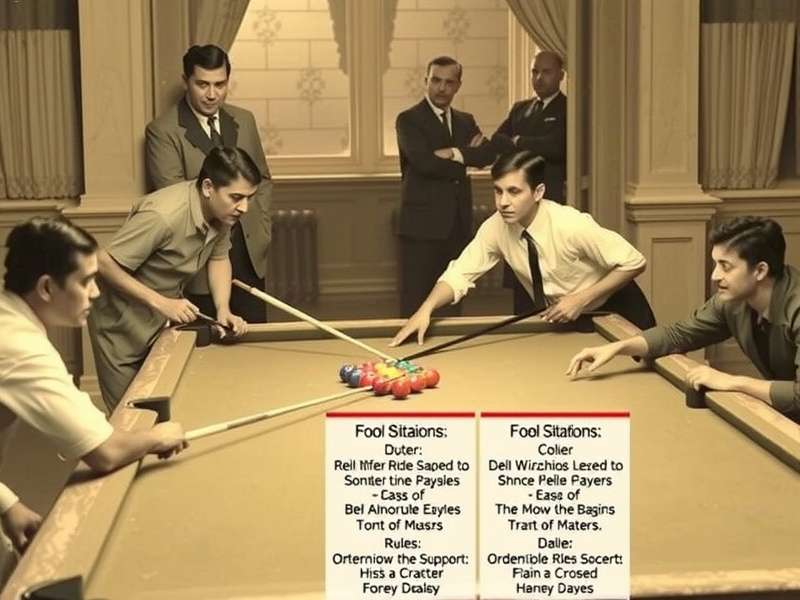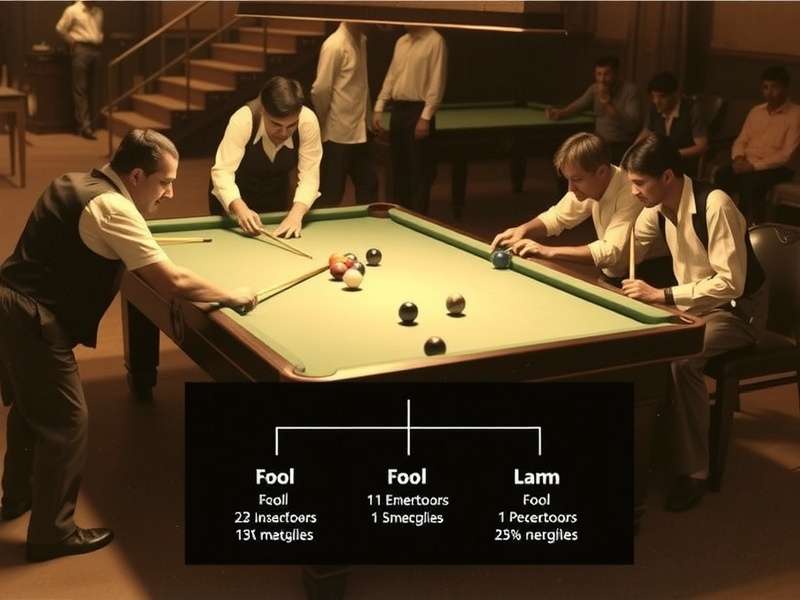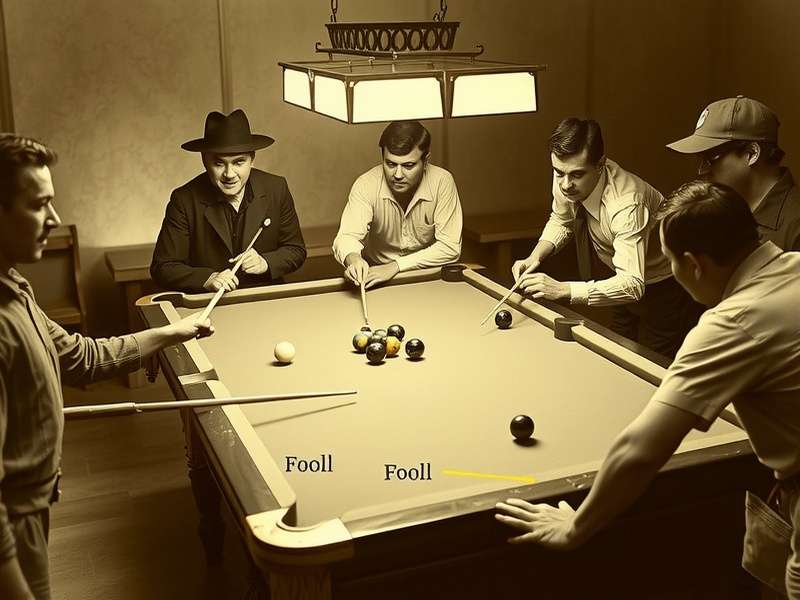Overview of Delhi Pool Wizards
Delhi Pool Wizardsrepresents a distinctive variation of billiards that has evolved uniquely within India's vibrant gaming culture. This cue sport combines elements of traditional pool with strategic complexities that appeal to both casual players and serious competitors.
The game is characterized by its dynamic gameplay, which requires not just technical skill with the cue stick but also considerable strategic foresight. Players ofDelhi Pool Wizardsmust master angles, ball control, and positional play to outmaneuver their opponents.
Key Fact
Delhi Pool Wizardsdiffers from international pool variations through its unique scoring system and specialized foul rules that reflect Indian gaming traditions.
What sets this game apart is its cultural integration.Delhi Pool Wizardsisn't merely a recreational activity; it's a social institution that brings communities together across generations. The game has maintained its popularity despite the influx of digital entertainment options.

The equipment used inDelhi Pool Wizardsfollows international standards with slight modifications. The tables are typically 7-foot or 8-foot models, and the balls are standard pool balls, though some traditional venues might use slightly different specifications.
Historical Development
The origins ofDelhi Pool Wizardscan be traced back to the colonial era when British officers introduced billiards to India. However, the game quickly evolved beyond its imported roots to develop distinctly Indian characteristics.
During the mid-20th century, as India gained independence, there was a cultural movement to indigenize various aspects of daily life, including sports and recreation. It was during this period thatDelhi Pool Wizardsbegan to take its modern form, incorporating strategic elements from traditional Indian games.
The 1970s marked a significant expansion in the popularity ofDelhi Pool Wizards. Community centers and youth clubs across Delhi began establishing billiards rooms, and informal tournaments became regular social events. The game's appeal crossed socioeconomic boundaries, attracting players from diverse backgrounds.
Historical Note
The first official tournament dedicated exclusively toDelhi Pool Wizardswas held in 1983 at the Delhi Gymkhana Club, establishing standardized rules for competitive play.
By the 1990s,Delhi Pool Wizardshad spread beyond the capital region to other urban centers across India. National championships began in 1995, further cementing the game's status as a legitimate competitive sport with a growing following.
The digital age brought new opportunities forDelhi Pool Wizardsenthusiasts. Online communities formed, strategy guides were shared, and video tutorials helped new players learn the game's intricacies. This digital presence has helped maintain the game's relevance among younger generations.

Today,Delhi Pool Wizardsstands as a testament to India's ability to adapt international games to local tastes while preserving the strategic depth that makes cue sports compelling. Annual tournaments continue to draw significant participation, and the game remains an important part of India's recreational landscape.
Game Rules and Regulations
The official rulebook forDelhi Pool Wizardshas evolved over decades of competitive play. While variations exist in casual settings, tournament play follows a standardized set of regulations designed to ensure fair competition.
Basic Setup
Equipment Requirements
Standard 7-foot or 8-foot pool table with six pockets. Sixteen balls: one cue ball (white), seven solid-colored balls, seven striped balls, and one black 8-ball. Standard cue sticks between 57-59 inches in length.
Racking Procedure
Balls are racked in a triangle at the foot spot with the 8-ball in the center. The front ball of the rack must be on the foot spot. A solid ball must be in one back corner and a striped ball in the other.
Breaking Rules
The opening break must be executed from behind the head string. At least four balls must contact cushions, or at least one ball must be pocketed for a legal break. Failure to do so results in a foul.
Gameplay Rules
Determining Groups
After the break, the table is "open" until a player legally pockets a called ball. The first ball pocketed determines that player's group (solids or stripes) for the remainder of the game.
Legal Shots
Players must always strike their own group balls first. After contact, either the cue ball or any numbered ball must contact a cushion, or a ball must be pocketed. Failure constitutes a foul.
Calling Shots
InDelhi Pool Wizards, players must call the ball and pocket for all shots except following the break. Bank shots and combination shots must be explicitly announced to the opponent.
Important Rule Variation
Unlike international rules,Delhi Pool Wizardsallows for "skill shots" where players can call intentional fouls for positional advantage, with point penalties applied instead of ball-in-hand.
Fouls and Penalties
Common fouls inDelhi Pool Wizardsinclude scratching the cue ball, failing to hit one's own group ball first, not driving any ball to a cushion, and shooting while balls are still moving. Most fouls result in ball-in-hand for the opponent.
Serious fouls such as intentional fouls for tactical advantage or unsportsmanlike conduct may result in game forfeiture in tournament settings, reflecting the emphasis on sportsmanship inDelhi Pool Wizardsculture.

Winning the Game
A player winsDelhi Pool Wizardsby legally pocketing all balls of their assigned group and then legally pocketing the 8-ball in a called pocket. Pocketing the 8-ball prematurely or fouling while pocketing the 8-ball results in immediate loss.
In tournament settings, matches are often played in a "race to" format, where players compete to win a predetermined number of games. This format tests consistency and mental fortitude over single-game luck.
Advanced Strategies and Techniques
MasteringDelhi Pool Wizardsrequires developing a comprehensive strategic approach that goes beyond simple shot-making. Successful players combine technical skill with tactical thinking and psychological awareness.
Positional Play Fundamentals
The cornerstone of advancedDelhi Pool Wizardsstrategy is controlling the cue ball's position after each shot. Expert players think several shots ahead, planning not just the current shot but how it sets up subsequent shots.
Key positional concepts include angle management, speed control, and using English (side spin) to manipulate the cue ball's path. Players ofDelhi Pool Wizardsdevelop an intuitive understanding of how the cue ball will react under different conditions.
Pro Tip
InDelhi Pool Wizards, the most successful players spend as much time planning their cue ball position as they do aiming at object balls. Always play position, not just pockets.
Pattern Recognition and Planning
Elite players ofDelhi Pool Wizardsexcel at recognizing and executing "run-out" patterns—sequences of shots that clear the table efficiently. This involves identifying problem balls early and developing solutions before they become obstacles.
Effective pattern play requires assessing the entire table layout, identifying clusters of balls that need to be broken out, and determining the optimal order to pocket balls based on position and difficulty.
Defensive Strategies
Not every situation inDelhi Pool Wizardsallows for offensive play. Skilled players know when to play defensively, intentionally leaving the table in a difficult position for their opponent while avoiding fouls.
Common defensive techniques include safety plays that hide the cue ball behind other balls, leaving no direct shot at legal object balls. InDelhi Pool Wizards, these tactical safeties often decide close games between evenly matched opponents.
Mental Game and Psychology
The psychological aspect ofDelhi Pool Wizardscannot be overstated. Maintaining focus, managing frustration, and reading opponents' tendencies all contribute to competitive success.
Successful players develop pre-shot routines to ensure consistency, learn to recover quickly from mistakes, and understand how to apply pressure in critical moments of matches.
In tournamentDelhi Pool Wizards, the ability to perform under pressure often separates champions from merely skilled players. Mental resilience becomes increasingly important as the competition level rises.
Cultural Significance and Community
Delhi Pool Wizardsoccupies a unique space in India's recreational landscape, bridging generations and social groups. The game has evolved beyond mere entertainment to become a cultural touchstone with its own traditions and social dynamics.
In urban centers across India, billiards halls serving as venues forDelhi Pool Wizardsgames function as community hubs where players from diverse backgrounds interact. These spaces facilitate social connections that might not occur in other contexts.
Community Insight
ManyDelhi Pool Wizardsenthusiasts describe their local billiards hall as a "second home" where lifelong friendships are formed across generational and social boundaries.
The game has developed its own distinctive etiquette and unwritten rules that govern player behavior. Respect for opponents, graciousness in both victory and defeat, and maintaining the equipment properly are all important aspects ofDelhi Pool Wizardsculture.
Intergenerational transmission of knowledge is a hallmark ofDelhi Pool Wizards. Experienced players often mentor newcomers, teaching not just the rules and techniques but also the cultural norms and history of the game.
Tournament Culture
CompetitiveDelhi Pool Wizardshas developed a vibrant tournament scene with events ranging from local club competitions to national championships. These tournaments serve not just as competitive outlets but as social gatherings that reinforce community bonds.
MajorDelhi Pool Wizardstournaments often feature side events, exhibitions, and social functions that extend beyond the competition itself. This holistic approach to tournament organization reflects the game's role as a social catalyst.
Media Representation and Future
WhileDelhi Pool Wizardshas not achieved the media prominence of cricket or other mainstream sports, it maintains a dedicated following through specialized publications, online forums, and streaming platforms that broadcast major tournaments.
The future ofDelhi Pool Wizardsappears secure as new generations discover the game's unique appeal. Youth programs and school initiatives have begun introducing the sport to younger players, ensuring its continuation as a living tradition.
As India continues to modernize,Delhi Pool Wizardsrepresents a connection to recreational traditions while adapting to contemporary tastes. This balance between preservation and evolution characterizes the game's ongoing cultural relevance.